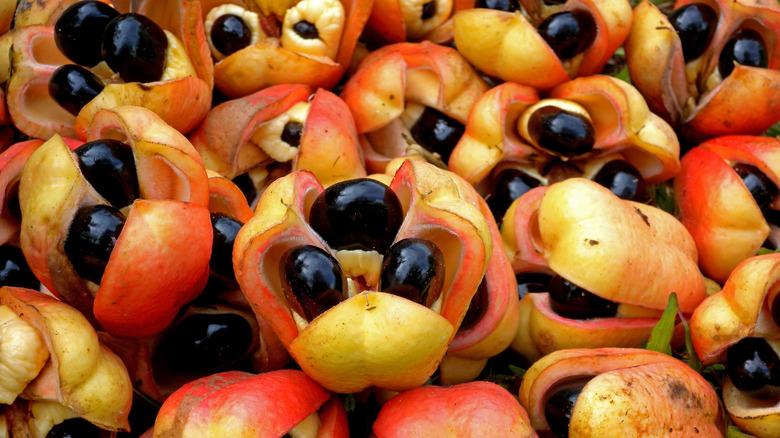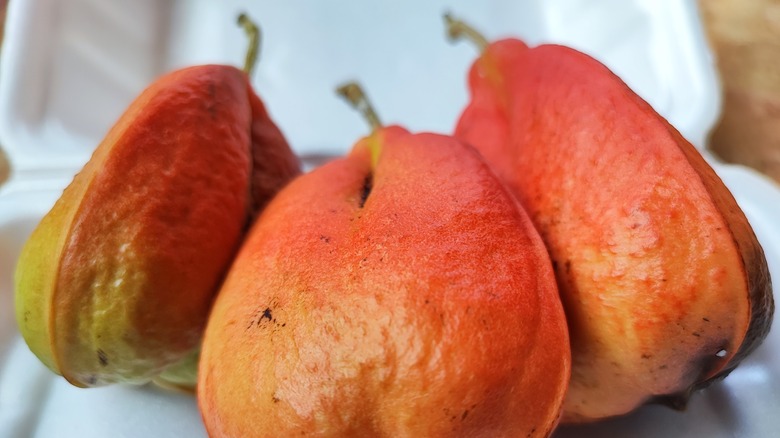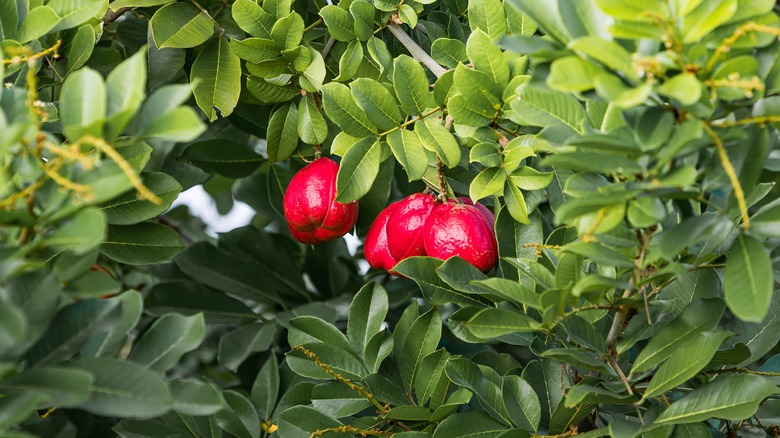Why It's Illegal To Bring The National Fruit Of Jamaica Into The US
A conversation about government-seized fruit may stir up controversy. The United States has flagged ackee, the national fruit of Jamaica, because it is potentially lethal for consumption when it has yet to undergo the ripening process, according to the U.S. Food and Drug Administration. A bite of the yet-to-age fruit may prove more than bitter due to a particular toxin that can cause death.
Ackee is known as a tropical fruit. It has skyrocketed to the height of popularity in Jamaica, earning a spot in the Caribbean country's national dish with salt fish. Other neighboring island countries such as Grenada and Trinidad also produce the fruit. Ackee is grown in South Florida, though very rarely for commercial purposes since most forms of the raw fruit are banned for sale. However, alerts over the fruit may sour its reputation in the States.
Those who import the fruit — whether canned, dried, or frozen (fresh isn't allowed at all) — without authorization are on notice for the possible detainment of their shipments in the United States. Exporters will have to petition the FDA to bring the fruit into the country if they are excluded from the organization's "green list" of approved ackee products. Thus, authorities have put the fruit under the national spotlight, with any unlawful transfer of the fruit into the U.S. raising red flags.
Unripe ackee has a potentially lethal toxin, hypoglycin A
The unripened part of ackee contains substantial amounts of hypoglycin A, a dangerous toxin. The FDA classifies the toxin as "heat stable," meaning that the pollutant can survive during the cooking process. Given that the toxin can resist any changes or destruction under high temperatures, even when cooked, it poses more of a threat to health.
Additionally, the fruit's rind (or skin) and seeds are unsafe to eat because these parts contain hypoglycin A. Per the FDA, ackee can contain up to 100 parts per million (ppm) of hypoglycin A and be safe to eat. However, more than that allotted amount is unsafe. The overall amount of the toxin in the fruit depends on ripeness, but the rind and seeds will still have elevated doses of hypoglycin, even in aged ackee.
The FDA says that ripened and "properly processed" parts of ackee are safe for consumption. When ripening, the fruit turns from pale green to shades of yellow, orange, and red. You can tell that ackee is ripe when the rind splits open naturally to reveal arils, or edible pale yellow parts. The arils have hard, dark seeds. If the fruit remains closed or there are discolored arils, the fruit is unsafe and poisonous. Any artificially ripened ackee is also harmful, so you should only use this rice trick to ripen fruit like mango and avocado, not ackee.
Immature ackee contains toxins that cause several symptoms
When left unripened, ackee poses significant health risks. The immature fruit, if ingested, can lead to low blood sugar or hypoglycemia, among other dangerous issues that affect the body's ability to function properly. Hypoglycemia can also bring about confusion, dizziness, headaches, seizures, and comas, which can cause long-term adverse effects.
A bite of unripe ackee can also lead to liver damage and severe vomiting. For women who are pregnant or breastfeeding, the FDA warns that both unripe and ripened ackee are extremely unsafe to eat in any amount. Children are also particularly vulnerable to the harmful effects and should never ingest ackee in its unripened form. There is also a lack of credible evidence about how ripened ackee can affect pregnant women and children, so the FDA suggests erring on the side of caution. As many cook and prepare ripened ackee or pair the exotic fruit found in tropical climates with fish as a delicacy, they must be aware of the dangers.


